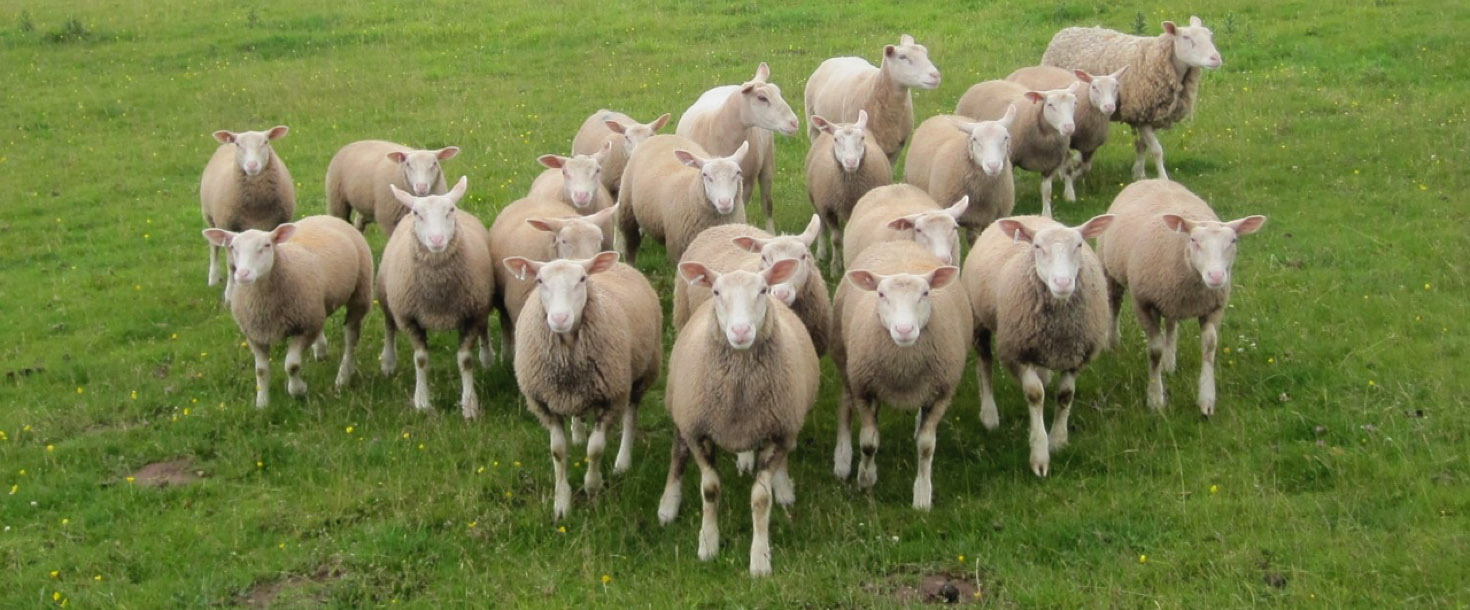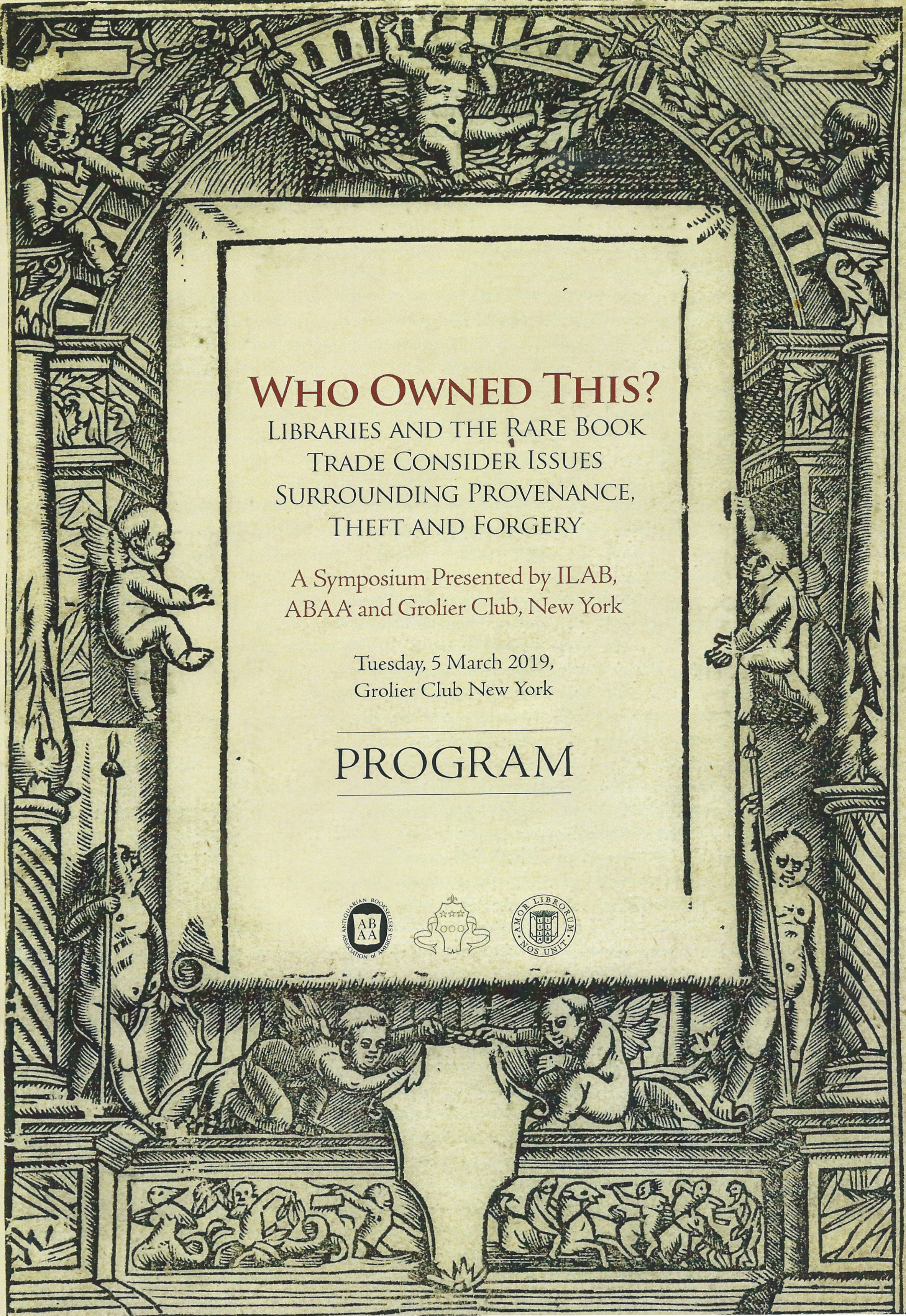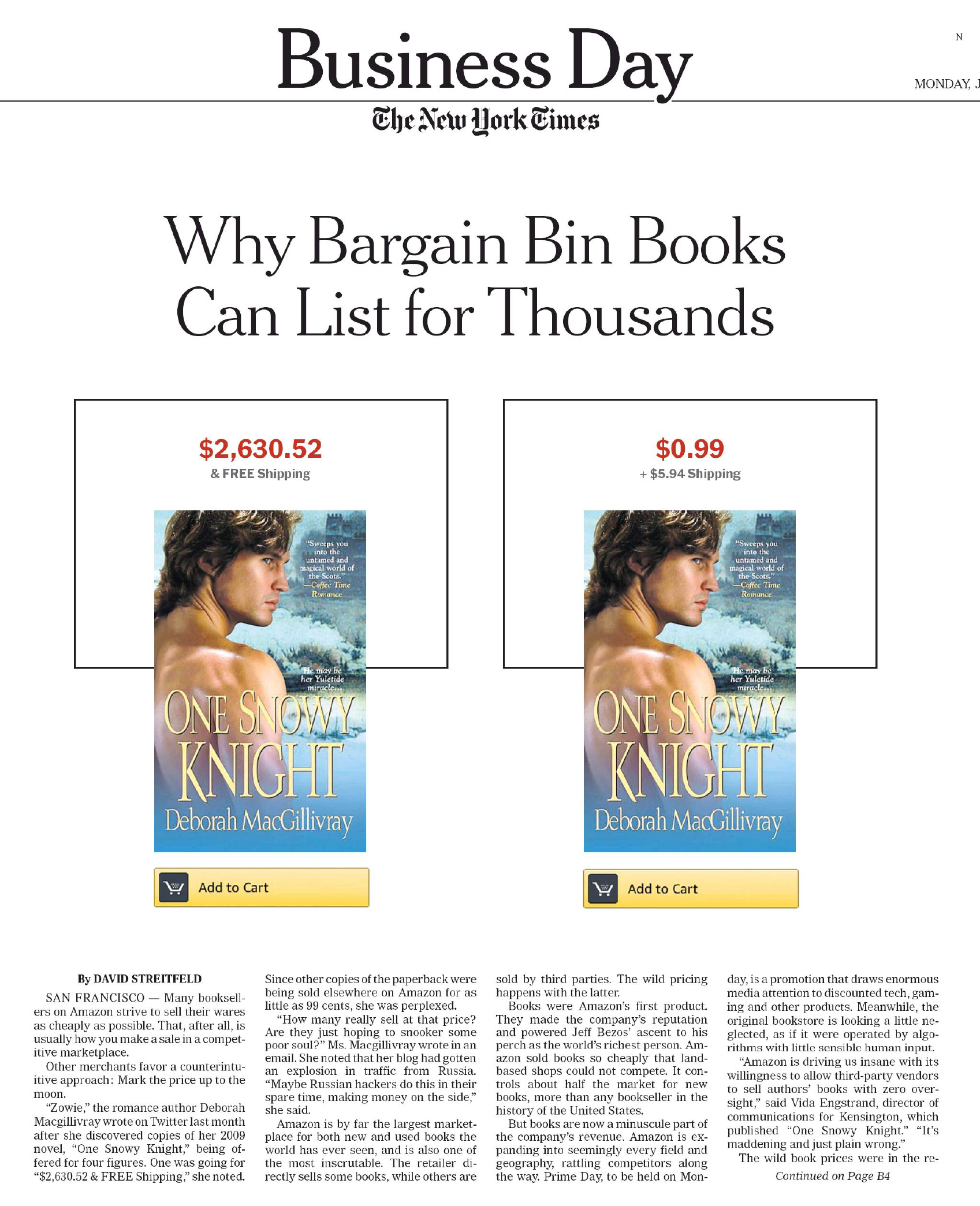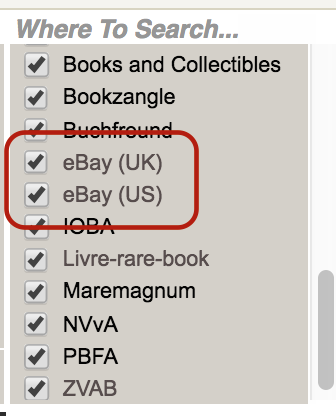John Henry said to the captain,
“A man ain’t nothin’ but a man,
But before I let your algo beat me down,
I’ll die with a pencil in my hand
Lord, Lord
I’ll die with a pencil in my hand.”
Back in September the issue of algorithmic pricing surfaced in one of the ABA (Antiquarian Booksellers Association) email Bulletins. It came in response to a letter sent by a member to myself and the ABA office seeking an explanation for a strange phenomenon he had recently observed: out-of-print text books on sites like Amazon and AbeBooks were being listed at absurd prices, in some cases reaching into six figures. He wondered if this might possibly be evidence of a new scam devised to fleece careless librarians who used automated ordering systems and may not be noticing the prices that they pay. I suggested, instead, that the most likely explanation was that software, rather than human intelligence, was being used to price the books.
Shortly thereafter the ABA newsletter editors, ever conscious of the need to fill pages, asked if I could elaborate on the subject for a forthcoming issue. Having already exposed myself in the pose of someone who understood this depressing subject I did not then find myself in a position to refuse their request. It is not a subject I would otherwise choose on my own, but here it is.
Let me say, right off, that what I know about this subject has no basis in personal bookselling experience. I have never let a machine price my books or even been in the presence of a machine that I knew was programmed to do so. I would be fascinated to hear a personal account from a colleague who had actually tried this with his own books, but I suspect that if there really is someone amongst us who has already ventured down this gloomy path he would be reluctant to step forward and tell us about it. So you are left with me.
Algorithmic pricing (also known as robo pricing) refers to the use of specialized computer programs to automate the pricing of books (or anything else for that matter). The best known providers of these programs are Monsoon and Fillz. Once provided with the ISBN number of any book, either of these services can connect to the internet and retrieve the prices and other relevant information for all the copies of that book available on the major book sites. This is, of course, an automated version of what most of the rest of us already do manually nearly every day. But the robopricing engines take this one step further and include the ability to customise a small program (the “algorithim”) that processes all the data that it collects and spits out a price to match the particular instructions it was given. It might, for instance, decide that it wants its copies to be priced at the exact median of all available copies (a bad strategy I would think) or to be 5 pence cheaper than any other copy, or half the average of any book with over 10 listings, or to be priced with virtually any other clever strategy the bookseller might conceive. Moreover, the software runs on a kind of auto-pilot that can continuously update prices online as things change, or even if they don’t . The knowledge and experience of the bookseller plays no role in this operation. Facts about the book itself are irrelevant. All that is taken into consideration is the quantifiable information that can be gathered from the current online listings tied to a given ISBN.
The “algo” has no problems doing its job as long as it is given data to process, but the situation can become “interesting” when there are little or no other copies available for it to price against. Then anything is possible. This was almost certainly the situation with the books that the concerned member was noticing. With nothing real to go on, the algorithm just went fishing with a very optimistic idea of what price might be possible. It did not have to do this, of course. The algorithm could have been designed with more reasonable expectations. In this case it was just badly designed, and the result was a book that would not sell, at least until the algorithm decided to bring it back down to earth, which it probably eventually did.
An even crazier situation can result when there are only two copies of the same book available at the same time and both are being priced by algorithms that require their copy to always be the second least expensive available. (Or the most expensive, though I doubt that actually occurs) Books in this circumstance have been known to reach prices in the millions.
When this happens to a rare but insignificant book it may be good for a snicker or a chuckle, but in the end it is probably harmless. What robo pricing does at other end of the scale, however, is much more significant and, increasingly, pervasive. This is because the algorithms are really designed to drive prices down rather than up. They are meant to find the price at which an item is most likely to sell, and that price is almost always the lowest price. When there are hundreds, or even just dozens of identical copies available it is a clear sign that the supply of that book greatly exceeds the demand. In that case, the successful algorithm will be the one that prices a copy at the lowest possible price. If multiple sellers are using similar algorithms then it is likely the price will drop to a penny, or whatever is set as the minimum price for that particular site.
The issue of profit may be irrelevant in this case. It is probably more a question of minimizing final costs. Once a book has been purchased, entered into the system, and determined to be too common to sell, it then becomes a question of cutting the bookseller’s loss. Does it produce the least loss to cull and pulp it, indefinitely allocate a section of finite shelf space for it, or sell it in return for 1p + postage + the email address and personal details of someone now known to buy second-hand books. In many cases it will be the one penny sale. This is probably the kind of decision a machine can make much better than a human.
Fortunately, hardly any of us ever have to deal with books of that sort. But there are books that fall somewhere between the two extremes described above, and it is with these that the robo pricers expose a new reality that most of us will need to understand and, in a some cases, adapt to.
In the past, the price of a given book, usually pencilled onto the fly leaf, was set by the seller at a carefully considered figure he believed one of his potential customers might eventually be induced to pay for it. At the point of sale, in most cases, only one copy and one price would be involved in the decision to purchase. Unless sold to another customer, the book that was refused one day would almost always have the same price two weeks, two months or two years later. This is the way most retail products have traditionally been priced, and second-hand booksellers were no exception. The arrival of the internet changed this in at least one important respect: the seller, for the first time, had easy access to the prices and other details of all the copies being offered by his competitors at that moment and could set his own price on that basis.
There had always been something that you could call a “marketplace” for old books, but before the internet it operated in a dense fog. Some historical information about the prices of books existed in auction records, price guides and in the proprietary memories of booksellers. Generally accessible information about current availability and prices, however, did not exist. There was no real marketplace where public knowledge of current prices and supply was available to all participants. By making that information available in real time the internet changed the “marketplace” for rare and second-hand books from a metaphor to a reality.
We are all now dealing with the enormous disruption that results from this. Our accustomed ability to operate as free traders outside the pricing forces of an open marketplace is continuously challenged and reduced. Only the portion of the book trade that deals in genuinely rare books escapes these pressures.
It would be merciful to leave the story there and not look further ahead, but the subject I started with cannot really be closed without noting one further aspect in which algorithmic pricing significantly alters the business of selling books: commoditisation. Algorithms can set their prices dynamically. The idea that you pencil a price into a book and then leave it there until it’s sold may soon become a quaint anachronism. And when a book price can change dynamically on the basis of all the other prices that are also continuously changing it creates a pricing process where the acquired knowledge of booksellers is, ultimately, unnecessary, if not useless. In that circumstance the book becomes a commodity plain and simple. As with any commodity exchange, the market sets the price and the human participants are only there to record the transactions, collect the money and arrange delivery. On the product side, Amazon has, of course, been treating books as commodities in this respect from it’s very beginning. When dynamic pricing engines come to set the price of a given ISBN or ASIN in an open online marketplace then the transformation, for that book at least, is complete.
Our one consolation is that this commoditisation, if it does indeed take place, will most likely be restricted to books that have ISBN numbers and always have at least a few similar copies for sale online. I suspect that there are very few ABA members who derive a major portion of their income from online sales of books like these. They can be thankful that they do not. But for the portion of the online book trade that does not regularly handle rare or pre-ISBN books the future may not be so bright.
(Updated July 16, 2018)

 I recently listened with great interest to an online recording of the 2019 Malkin Lecture delivered last month at the Rare Books School in Virginia by Heather O’Donnell and Rebecca Romney. Its provocative title was: “The Right and Wrong Ways to Collect.” If you missed the live performance and haven’t yet caught the recorded version then I would strongly encourage you to click this link –
I recently listened with great interest to an online recording of the 2019 Malkin Lecture delivered last month at the Rare Books School in Virginia by Heather O’Donnell and Rebecca Romney. Its provocative title was: “The Right and Wrong Ways to Collect.” If you missed the live performance and haven’t yet caught the recorded version then I would strongly encourage you to click this link –  The 8 speakers spoke on various subjects relating to the difficult but timely problems faced by booksellers and librarians in connection with provenance, theft and forgery. I was honored by being assigned the closing position and used it to consider these subjects with a particular regard to the use of databases to protect from theft, recover stolen books and establish provenance. At the end I ventured a few general speculations about how the database technologies of the future may be even more useful for these purposes, including a preview of some of the things that viaLibri will be doing to make use of these technologies. The title of my paper was: “
The 8 speakers spoke on various subjects relating to the difficult but timely problems faced by booksellers and librarians in connection with provenance, theft and forgery. I was honored by being assigned the closing position and used it to consider these subjects with a particular regard to the use of databases to protect from theft, recover stolen books and establish provenance. At the end I ventured a few general speculations about how the database technologies of the future may be even more useful for these purposes, including a preview of some of the things that viaLibri will be doing to make use of these technologies. The title of my paper was: “
 We are pleased to announce that viaLibri now includes books from eBay as part of its search results. If you look in the “Where to Search” panel in the upper right hand corner of our home page search form you will see two check boxes for eBay.com and eBay.co.uk. When these have been ticked the old, rare and out-of-print “Buy It Now” book listings from those two sites will be added to all the items from all the other sites we already search. This means that over 30 million more items have now become searchable.
We are pleased to announce that viaLibri now includes books from eBay as part of its search results. If you look in the “Where to Search” panel in the upper right hand corner of our home page search form you will see two check boxes for eBay.com and eBay.co.uk. When these have been ticked the old, rare and out-of-print “Buy It Now” book listings from those two sites will be added to all the items from all the other sites we already search. This means that over 30 million more items have now become searchable.